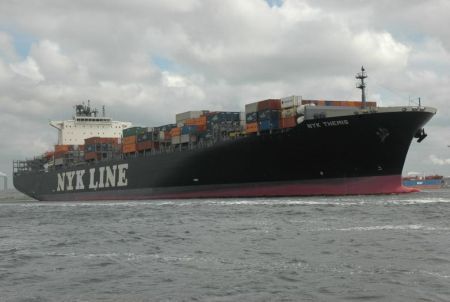
NYK has received certification (assurance statement) from a third-party certifier that attests that NYK reports and discloses accurate numerical values regarding the data for greenhouse gas (GHG) emissions collected from NYK Group companies, after having performed calculations that meet the framework of Scope 1, 2, and even 3 of the GHG Protocol — the international standards for accounting and reporting GHG emissions. This is the first time in the maritime industry that data collection, calculation, and reporting in line with Scope 3 have been certified by a third-party certifier and received the certification.
LRQA Japan, a third-party certifier, checked NYK’s GHG data for compliance with ISO14064 standards and the Corporate Value Chain (Scope 3) Accounting and Reporting Standard, and confirmed the credibility of the data. The GHG Protocol defines three scopes of GHG emissions: Scope 1 targeting direct GHG emissions from sources that are owned or controlled by a company; Scope 2 targeting indirect GHG emissions for consumption of purchased energy; and Scope 3 targeting indirect GHG emissions generated through the total value (supply) chain from purchasing, transport, to disposal of materials and services required for the company’s business activities.
The NYK Group has been aware that the need to respond to Scope 3 as a trend for data certification will be globally expanded. Thus, NYK reviewed its business activities of maritime and air cargo transport from life cycle assessment (LCA)5 perspectives, and started monitoring and reducing CO2 emissions from a wider framework, by positioning it as an NYK value chain where the group provides its services. Specifically, from this fiscal year, NYK is involved in activities to monitor and reduce CO2 emissions generated not only at the time when vessels and air freighters are operated as transport means, but also at the time when vessels and air freighters are manufactured, as well as when ship and jet fuels are refined.
By 2015, NYK aims to reduce CO2 emissions, the main GHG, generated from NYK’s operating vessels by 10 percent in basic units compared with 2010. NYK — including its group companies — is thus involved in the reduction of fuel usage in the operation of its vessels, air freighters, and land vehicles in daily business activities. Moreover, initiatives to reduce electricity consumption are proactively implemented at all NYK offices. In addition, targeting 69 companies in Japan and 114 overseas companies by using its proprietary systems, NYK collects and totals the monthly numerical values for fuel consumed during transport, as well as the electricity, gas, steam, and water used at each office—including waste materials. Using this data, NYK draws up charts of monthly trends and provides feedback to each company, thus enabling employees to understand trends.
Against a backdrop of a global trend for monitoring and calculating data on environmental loads in line with international standards, and to meet requests from customers and related groups/organizations, NYK will promote data monitoring and disclosure throughout the group, and reinforce the corporate stance to reduce its environmental load.
The NYK Group strives to pursue environmental conservation and preserve biodiversity to attain a sustainable society.
GHG Protocol
A globally used international guideline and standard for accounting and reporting greenhouse gas (GHG) emissions. GHG Protocol Initiatives, which have developed a methodology for the GHG Protocol, started in 1998 as cooperative activities by stakeholders including global companies, NPOs, and government organizations, centering on the World Resources Institute (WRI) — a U.S. think tank — and the World Business Council for Sustainable Development (WBCSD) that comprises 170 companies around the world. The GHG Initiatives develop accounting and reporting methodologies for GHG emitted by organizations (companies), including those in consideration of a life cycle assessment (LCA).
LRQA Japan
A Japanese subsidiary of Lloyd’s Register Quality Assurance (LRQA) that was established in the United Kingdom in 1985 by a 100 percent investment by Lloyd’s Register, and was certified as the first third-party certification organization in the country. LRQA Japan verifies environment management systems for the NYK Group’s 49 companies and 122 offices in Japan and overseas (as of June 2012), and issues certifications for ISO 14001 to individual companies and offices.
ISO14064
A comprehensive environmental standard published by the International Organization for Standardization, and a requirement to quantify mainly GHG emissions and absorptions
We use cookies to improve your experience. By continuing to use our site, you accept our Cookies, Privacy Policy,Terms and Conditions. Close X